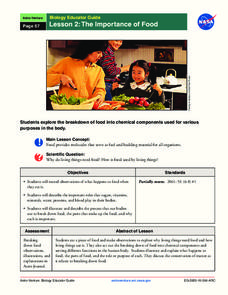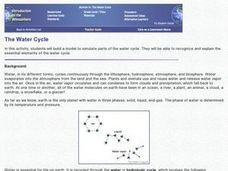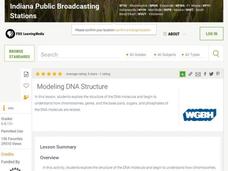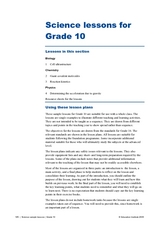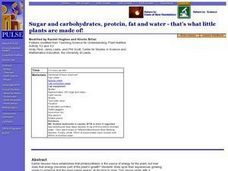Curated OER
Three Clouds Activity
Learners explore how clouds are produced through three different age-appropriate hands-on experiments.
Curated OER
Matter: Build a Word
Fourth graders examine matter and the periodic table of elements. In this matter lesson, 4th graders discuss atoms and their composition. Students explore the periodic table of elements and use it to spell words out of the elements.
Teach Engineering
Capillarity – Measuring Surface Tension
How do cohesion and adhesion work together? The third installment of a nine-part series teaches young scientists the difference between adhesion and cohesion. They also learn how cohesion and adhesion work together to cause capillary...
Teach Engineering
Superhydrophobicity – The Lotus Effect
Discover and demonstrate the Lotus Effect and superhydrophobic surfaces with the eighth installment of a nine-part series that teaches scholars about surfaces that exhibit superhydrophobicity. The lesson plan continues...
NOAA
Methane Hydrates – What's the Big Deal?
Have you ever tried to light ice on fire? With methane hydrate, you can do exactly that. The ice forms with methane inside so it looks like ice, but is able to burn. The lesson plan uses group research and a hands-on activity to help...
NASA
The Importance of Food
Pupils make observations while eating food. They act out the process of food breaking down in the body and the roles of various chemical components, such as sugar and protein. It concludes with an activity illustrating the process and a...
Virginia Department of Education
Charles’ Law
Searching for a relatively interesting way to demonstrate Charles' Law? Here is a lesson in which pupils heat air inside a flask and then cool the flask to quickly cool the air. They make observations about what occurs during the...
NOAA
What's the Big Deal?
Who knew that a possible answer to Earth's energy resource problems was lurking deep beneath the ocean's surface? Part four of a six-part series introduces Earth Science pupils to methane hydrate, a waste product of methanogens. After...
Curated OER
Do You Know the Master Programmer?
Fourth graders, using candy, build models of DNA replication, RNA transcription, and tRNA translation.
Curated OER
Catering Middle-School Science: Monomers, Polymers, and Macromolecules
Students investigate foods. For this biology lesson plan, students will conduct testing on different types of foods as they learn about different molecules that make them up. Students will also learn about the shapes of the molecules.
Curated OER
The Water Cycle--Model Simulation
Students build a model to simulate parts of the water cycle. They recognize and explain the essential elements of the water cycle.
Curated OER
Soap Bubble Chemistry
Students investigate soap bubbles. In this soap bubble chemistry lesson plan, students observe a demonstration using pop-it beads to represent a soap molecule. Students produce soap bubbles in the lab by making bubbles with a large...
Curated OER
Beads, Balls, and Beakers
Students analyze the amount of space required to pack round objects. In this geometry lesson, students practice using space economically by practicing packing spheres into beakers. They then translate this concept to molecules being...
Curated OER
Water Cycle Activity
Young scholars build a model and observe the cycle of evaporation and condensation that occurs in the water cycle. They see how the water cycle works, such as water condensing on the side of the jar and drops precipitating into rain...
Curated OER
Polymer
Learners investigate polymers by completing 3 experiments. In this polymer lesson plan, students mix plastic with acetone, they create polyurethane foam, they make slime and build a polymer model once their polyurethane foam is set. ...
Curated OER
Matter, Matter
Learners define vocabulary related to the parts of the atom. In this matter instructional activity, students navigate the web to find the structure and the forces that affect atoms. Learners complete an experiment with...
Curated OER
Heat Discrepancies
Students answer the question, "Why do Eskimos build houses out of ice to keep warm. Since heat goes from hot to cold, don¿¿¿t the ice walls take away the warmth inside the house?" They explain how snow or ice can actually be insulators.
Curated OER
Desalination: Creating a Solar Still
To better understand how solar power can aid in creating desalinated drinking water, the class creates a model still. They will build a model of a solar still, make observations, and discuss how the process works. While the idea behind...
Montana State University
Climb into Action!
Climate change affects even the largest and intimidating of landforms—even Mount Everest! A resource helps teach learners the connection between global climate change and its effects on Earth. Activities include videos, class discussion,...
Curated OER
Modeling DNA Structure
Young scholars build their own DNA molecules using candy. In this science lesson, students build DNA molecules using licorice and gumdrops. The lesson includes the use of streaming videos from the teacher's domain.
Curated OER
Science Lessons for Grade 10
Tenth graders identify the parts and functions of the cell. In this series of science lessons, 10th graders investigate crystal formation in covalent compounds. They investigate the factors affecting reaction rates.
Curated OER
Sugar and carbohydrates, protein, fat and water - that's what little plants are made of!
Students identify photosynthesis as the mechanism by which plants convert sunlight energy into a usable energy source for plant processes. They identify photosynthesis as the mechanism by which plants create a molecule that can be used...
Curated OER
Molecular Models Laboratory
Students use models to visualize molecular structures. Students read about Lewis dot structures, hybridization, and formal charge. Then students build and draw the molecules and ions given. Students complete 11 pre-lab questions and 4...
Curated OER
DNA Model and Protein Synthesis
Students build a 3-dimensional model of DNA coding for the hormone oxytocin.





